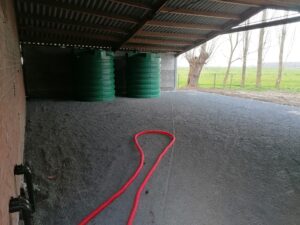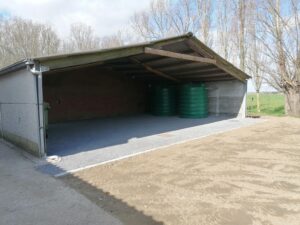 On April 2, 2021 camping 't hof Bellewaerde opened its doors. The campsite can accommodate 29 campers or caravans, 15 tents and 32 beds in the hostel. You really stay here in the warfield of World War I with craters in the landscape and archeology under your feet. Because digging is not allowed in this historically valuable soil, utilities for drinking water and waste water could not be installed. As a solution, Rietland placed one Phytoparking of 76m² for 105 PE under the canopy of the existing bicycle shed.
On April 2, 2021 camping 't hof Bellewaerde opened its doors. The campsite can accommodate 29 campers or caravans, 15 tents and 32 beds in the hostel. You really stay here in the warfield of World War I with craters in the landscape and archeology under your feet. Because digging is not allowed in this historically valuable soil, utilities for drinking water and waste water could not be installed. As a solution, Rietland placed one Phytoparking of 76m² for 105 PE under the canopy of the existing bicycle shed.
The underground reed bed consists of a separate basin that purifies grey water (waste water from showers and kitchen) and one for black water (toilet water) of 44m² and 32m² respectively. In addition, part of the purified waste water is reused as toilet water. Drinking water is also made on site from rainwater. If the campsite is operating at full capacity during a warm summer, the amount of rainwater may be insufficient. That is why research is being done into whether purified grey water can also be upgraded to drinking water. Ghent University is investigating what camping guests think of the reuse of waste water.
The ecological and archaeological impact of this campsite on its surroundings is therefore minimal. This project was realized with our partners 't Hof Bellewaerde, Cofrax, UGent, Vlakwa and Vario under the flag of Flanders Circular. Two years of additional monitoring was sponsored by the European Horizon 2020 project Multi Source.
Click here for more information about the water cycle (Dutch or English) at 't Hof Bellewaerde, including an infographic, a video or download it article (Dutch).



